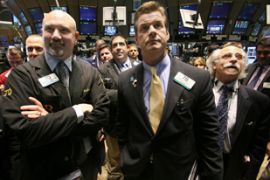US congress passes bailout bill
US House of Representatives passes $700bn Wall Street rescue plan.

| Bailout plan |
|
The US treasury will borrow $700bn from the international money markets by selling bonds to foreign countries. The treasury will then use the money to buy back mortgage backed-securities from US banks and institutions. |
However, the passing of the bill failed to trigger gains on Wall Street.
US stocks fell heavily as investors remained nervous about a global credit squeeze and weak economy.
The Dow Jones industrial average, which measures the stocks of leading US companies, fluctuated sharply, and ended the day down 157 points.
Al Jazeera’s John Terrett, reporting from the floor of the New York Stock Exchange, said that traders were angry at Nancy Pelosi, speaker of the House, who commented on the “party being over for Wall Street”.
“Traders were telling her to shut up and to get on with announcing the vote,” he reported.
“There seems to be a big schism in what goes on in the minds of Democratic politicans and those working in the cockpit of the world’s financial system here in Wall Street.”
Bush hailed the passing of the package, praising it as vital “to helping America’s economy weather the financial storm”.
The measure gives Henry Paulson, the US treasury secretary, the power to buy up bad debt from various Wall Street lending institutions.
Opponents of the bill have expressed concerns over handing that much power to one man, and reject the idea of using taxpayer money to bail out disgraced Wall Street firms.
New measures
Democratic and Republican negotiators agreed on the terms of the amended bailout on Tuesday, which includes extended tax cuts for businesses.
In another new measure, the bill raises the limit on federal insurance for bank deposits from $100,000 to $250,000.
“We all know that we are in the midst of a financial crisis,” John Boehner, the leader of the House Republican party, said shortly before casting his vote.
“And we know that if we do nothing, this crisis is likely to worsen and to put us into an economic slump like most of us have never seen.”
 |
| Pelosi, centre, said the bill was needed for financial stability [Reuters] |
Pelosi, a Democrat, said the bill was needed to “begin to shape the financial stability of our country and the economic security of our people”.
Bill Spriggs, an economics professor at Howard University, told Al Jazeera that the bailout will restore trust between banks and get liquidity into the system.
“However, the United States still has to figure out how to bail out Main Street,” he said. “Household debt is still a problem that has been unattended to.
“The folks on Wall Street scream louder, which is why their problems were attended to, but the American people don’t know how to scream, becasue they have been told throughout the Bush years that the market will clear all this, this is no a problem, but it has oviously manifested itself into a huge problem.”